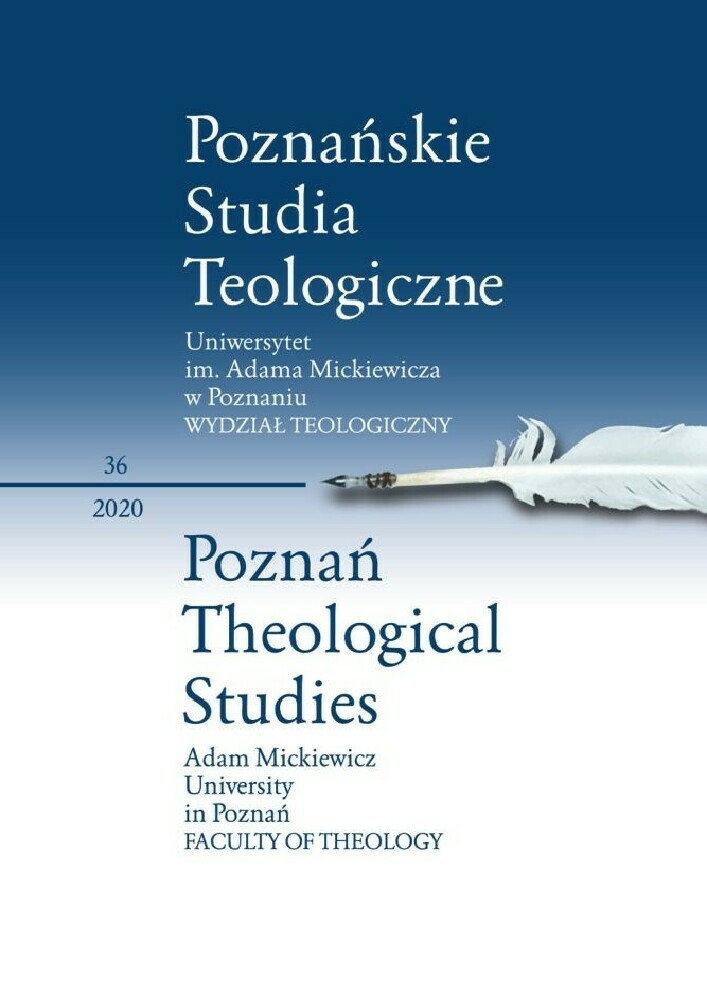Abstrakt
The conducted exegesis of some particular verses from the Septuagint indicates that two initial covenants made between a representative of the chosen nation with a Gentile party (Abraham and Solomon) did not breach the obligations resulting from the Law of Moses. The theological portrait of Abraham in the Book of Genesis captures an unambiguous evaluation of his conduct in accordance with the Law although the Law itself appeared considerably later when Moses lived. The pact between Solomon and Hiram deserves a similar evaluation. However, the later covenants between the kings of Israel and Judah with Gentile rulers deserve an extremely negative evaluation. Although they did not formally violate the Mosaic prohibitions, they were evaluated as a violation of trust in the Lord as He was the only Partner of the covenant between Himself and the Israelites. Such an interpretation is possible especially in light of Deut 7:6 which accentuates the uniqueness of Israel as a nation chosen by God from among other nations. And because this selection of Israel was done on the foundation of the covenant made on the Mount Sinai, it should be a one-of-a-kind covenant that should not be replaced with another pact signed with a human being, and let alone a Gentile. In all of the cases above, starting from King Asa and ending with Archpriest Jonathan, there was a true violation of the rule whereby the Lord was the only Partner of the covenant with His people. Thus, each of the analyzed treatises met with valid criticism both from a prophet and the inspired author. It is difficult to treat these violations as a major breach of the faith of Israel because of the established diplomatic relations. However, it was the rule of God’s uniqueness as a foundation for any sphere in the life of the chosen people that was violated. It included the political sphere which should not be excluded from the chosen people’s faith.
Bibliografia
Allen L.C., Ezekiel 1–19, WBC 28, Dallas 1994.
Bailly A., Dictionnaire grec-français, Paris 1963.
Block D.I., The Book of Ezekiel: Chapters 1–24, NICOT, Grand Rapids–Cambridge 1997.
Brzegowy T., Księga Izajasza. Rozdziały 13–39, NKB.ST t. XXII/2, Częstochowa 2014.
Cazeaux J., Le partage de minuit. Essai sur la Genèse, LD, Paris 2006.
Christensen D.L., Deuteronomy 21:10–34:12, WBC 6B, Dallas 2002.
Coats G.W., Genesis: with an Introduction to Narrative Literature, FOTL 1, Grand Rapids 1983.
Cohn R.L., 2 Kings, (Berit Olam: Studies in Hebrew Narrative & Poetry, ed. by D.W. Cotter), Collegeville 2000.
Cooper L.E., Sr., Ezekiel: An Exegetical and Theological Exposition of Holy Scripture, NAC 17, Nashville 1994.
Craigie P.C. et al., Jeremiah 1–25, WBC 26, Dallas 1991.
Crowther D.S., Prophets & Prophecies of the Old Testament, Bountiful 1998.
De Jong M.J., Isaiah Among the Ancient Near Eastern Prophets: A Comparative Study of the Earliest Stages of the Isaiah Tradition and the Neo-Assyrian Prophecies, Leiden– Boston 2007.
Fritz V., 1 & 2 Kings. A Continental Commentary, Minneapolis 2003.
Greenberg M., Ezekiel 1–20: A New Translation with Introduction and Commentary, AB 22, Garden City 1983.
Hals R.M., Ezekiel, FOTL 19, Grand Rapids 1989.
Hamilton V.P., The Book of Genesis, Chapters 1–17, NICOT, Grand Rapids 1990.
House P.R., 1, 2 Kings: An Exegetical and Theological Exposition of Holy Scripture, NAC 8, Nashville 1995.
Huey F.B., Jeremiah — Lamentations: An Exegetical and Theological Exposition of Holy Scripture, NAC 16, Nashville 1993.
Jasiński A.S., Komentarz do Księgi proroka Ezechiela. Rozdziały 21–30, OBT 111, Opole 2013.
Kaiser O., Isaiah 13–39: A Commentary, OTL, Philadelphia 1974.
Krauss H., Küchler M., Erzählungen der Bibel II: Das Buch Genesis in literarischer Perspektive. Abraham —Isaak — Jakob, Göttingen 2004.
La Bible d’Alexandrie: Les Proverbes, t. 17, trad., éd. D.M. d’Hamonville, Paris 2000.
Lemański J., Księga Rodzaju, rozdziały 11,27–36,43. Wstęp — przekład z oryginału — komentarz, NKB.ST, t. I/2, Częstochowa 2014.
Levin Y., The Chronicles of the Kings of Judah: 2 Chronicles 10–36: A New Translation and Commentary, London–New York 2017.
Long B.O., 2 Kings, FOTL 10, Grand Rapids 1991.
Łach J.B., Księgi 1–2 Królów. Wstęp — przekład z oryginału — komentarz — ekskursy, (Pismo Święte Starego Testamentu, seria KUL, t. 4, cz. 2), Poznań 2007.
Mazar B., Geshur and Maachah, JBL 80 (1961) 1, s. 16–28.
McCarthy D., Notes on the Love of God in Deuteronomy and the Father–Son Relationship between Yahweh and Israel, CBQ 27 (1965), s. 144–147.
Montgomery J.A., Gehman H.S., A Critical and Exegetical Commentary: The Book of Kings, Edinburgh 1967.
Moran W., The Ancient Near Eastern Background of the Love of God in Deuteronomy, CBQ 25 (1963) 1, s. 77–87.
Moscati S., The Face of the Ancient Orient: Near Eastern Civilization in Pre-classical Times, Mineola 2001.
Nations J.F., Profits of the Prophets: A Biblical Reference, Bloomington (IN) 2012.
Nawrot J., Izrael wobec zakazu sprzymierzania się z poganami w wybranych tekstach Septuaginty: część I, „Poznańskie Studia Teologiczne” 34 (2019), s. 7–28.
Nawrot J., Zagłada Asyrii w teofanicznej symbolice ognia: Analiza tekstu Iz 30,27–33, Poznań 2000.
Patterson R.D., Austel H.J., 1,2 Kings, (Expositor’s Bible Commentary, vol. 4: Kings–Job: with the New International Version of the Holy Bible), Grand Rapids 1988.
Peterson B.N., Genesis as Torah: Reading Narrative as Legal Instruction, Eugene 2018.
Pierwsza i Druga Księga Kronik, tłum., wstęp i komentarz H. Langkammer, (Pismo Święte Starego i Nowego Testamentu w przekładzie z języków oryginalnych), Lublin 2001.
Sailhamer J.H., The Meaning of the Pentateuch: Revelation, Composition and Interpretation, Downers Grove 2009.
Smith G.V., Isaiah 1–39: An Exegetical and Theological Exposition of Holy Scripture, NAC 15A, Nashville 2007.
Sweeney M.A., I & II Kings: A Commentary, OTL, Louisville 2013.
Tadmor H., Cogan B., Achaz and Tiglath-Pileser in the Book of Kings: Historiographic Considerations, Bib 60 (1979), s. 499–503.
Vermeylen J., Du prophète Isaïe à l’apocalyptique: Isaïe I–XXXIV, miroir d’un demi-millénaire d’expérience religieuse en Israël, Paris 1977.
Warzecha J., Historia dawnego Izraela, Warszawa 2005.
Whybray R.N., Genesis [w:] The Oxford Bible Commentary, ed. by J. Barton, J. Muddiman, Oxford 2001, s. 38–66.
Licencja
© 2020 Uniwersytet im. Adama Mickiewicza w Poznaniu, Wydawnictwo Naukowe UAM, Poznań
OPEN ACCESS

